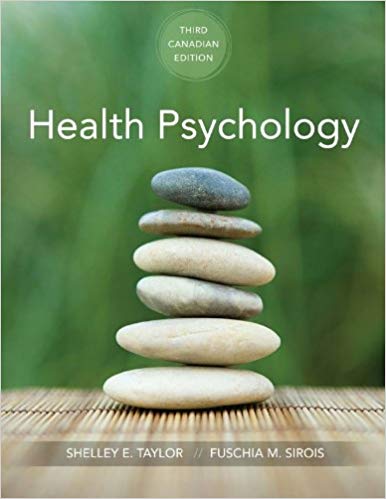Description
Health Psychology 3rd Canadian Edition By Shelley Taylor – Test Bank
c1
Student: ___________________________________________________________________________
|
1. |
The 1948 World Health Organization’s definition of health is analogous to a state of wellness. |
|
2. |
Early cultures took a dualistic approach to the mind and the body. |
|
3. |
The ancient Greeks believed in a humoral theory of illness. |
|
4. |
In conversion hysteria, the patient converts psychological conflict into a symptom which then relieves the patient of anxiety. |
|
5. |
The biomedical model emphasizes both health and illness. |
|
6. |
The biopsychosocial model emphasizes the importance of an effective patient-practitioner relationship. |
|
7. |
The most important factor giving rise to health psychology has been the expansion of health care services. |
|
8. |
Morbidity may be expressed in two ways: as the number of new cases or as the total number of existing cases of an illness. |
|
9. |
Although health psychologists have been employed in health settings for many years, they have difficulty establishing their credibility with physicians and other health care professionals. |
|
10. |
Public health researchers inform policymakers about changes that would benefit communities. |
|
11. |
The field within psychology devoted to understanding all psychological influences on health and illness across the life span is called A. psychosomatic medicine. B. health psychology. C. medical psychology. D. epidemiology. E. immunology. |
|
12. |
A health psychologist who designs a media campaign to get people to improve their diets focuses on A. health promotion and maintenance. B. prevention and treatment of illness. C. etiology and correlations of health, illness, and dysfunction. D. the health care system and the formulation of health policy. E. the philosophy of the mind-body relationship. |
|
13. |
A health psychologist who works with people who are already ill focuses on A. health promotion and maintenance. B. prevention and treatment of illness. C. etiology and correlations of health, illness, and dysfunction. D. the health care system and the formulation of health policy. E. the philosophy of the mind-body relationship. |
|
14. |
What does etiology refer to? A. causes of illness B. a special kind of disease state C. healthy behaviour D. stress effects E. the prevalence of disease in a population |
|
15. |
A health psychologist who is interested in the behavioural and social factors that contribute to disease focuses on A. health promotion and maintenance. B. prevention and treatment of illness. C. etiology and correlations of health, illness, and dysfunction. D. the health care system and the formulation of health policy. E. the biopsychosocial model. |
|
16. |
A health psychologist who studies the impact of hospitals and physicians on people’s behaviour focuses on A. health promotion and maintenance. B. prevention and treatment of illness. C. etiology and correlations of health, illness, and dysfunction. D. the health care system and the formulation of health policy. E. social psychology. |
|
17. |
Ancient cultures viewed the mind and the body as A. ultimately unknowable. B. somewhat interdependent. C. separate and autonomous systems. D. part of the same system. E. not much differently than we do today. |
|
18. |
According to the humoral theory of Hippocrates and Galen, disease is the result of A. trephination. B. evil spirits. C. an imbalance of bodily fluids. D. cellular disorders. E. God’s punishment. |
|
19. |
The idea that one’s biochemistry may be associated with certain personality characteristics can be traced to the A. Stone Age. B. ancient Greeks. C. Middle Ages. D. Renaissance. E. ancient Romans. |
|
20. |
In ____________________, the Church was the guardian of medical knowledge. A. ancient Greece B. the Middle Ages C. the Renaissance D. Freud’s era E. the Stone Age |





Be the first to review “Health Psychology 3rd Canadian Edition By Shelley Taylor – Test Bank”